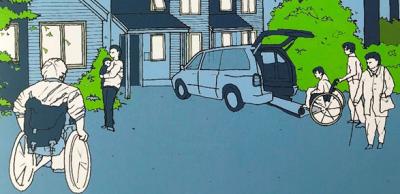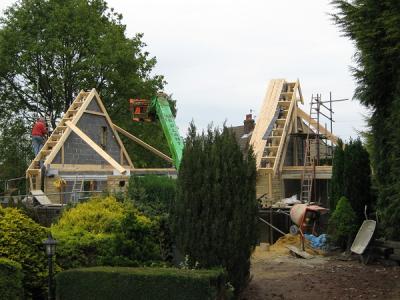Concerns over industry’s repeated objections to councils’ accessible homes plans
Representatives of the home-building industry are engaged in a nationwide campaign to defeat attempts by councils to ensure more accessible homes are built in their areas, research by the Disability News Service (DNS) has shown.
The objections to councils’ draft local plans concern their proposed targets for the proportion of new homes that should be built to accessible housing standards.
DNS reports that objections have been made to draft local plans drawn up by more than 15 local authorities, including Liverpool City Council, Sevenoaks District Council, Reading Borough Council, East Cambridgeshire District Council, Kettering Borough Council, Darlington Borough Council, Sunderland City Council and Middlesbrough Council.
Each of the objections is critical of the council’s attempts to impose targets for local housing developments that would see a certain proportion of new homes built to *M4(2) and M4(3) standards.
In response to Liverpool’s draft plans, the House Builders Federation says: "The HBF does not consider that this policy is required, it is considered that local needs can be met without the introduction of the optional housing standards."
It calls for the policy to be "deleted in its entirety" or, if the council retained the targets, "ensure they have the appropriate evidence to support this policy".
In the objection to the Sevenoaks plan, it says: "It cannot be sufficient to state that there is an ageing population who are more likely to require such homes.
"Our ageing population is a national concern and one faced by all areas. If this were sufficient justification then the Government would have made the standard mandatory. Therefore we do not consider the Council to have provided the evidence required by national policy to justify all new homes being built to the optional standard M4(2)."
"Isolated within their own homes"
An EHRC spokeswoman said this week: "Inappropriate or inaccessible housing is increasingly leaving disabled people trapped and isolated within their own homes.
"This is unacceptable in a modern society. The objections from Home Builders Federation are worrying and demonstrate the concerning attitudes that we raised in our recent housing inquiry."
Local authorities told us about their frustration at the system which pitches them against developers who challenge the viability of proposals for accessible housing. The situation would be greatly improved if building regulations were amended to ensure that all new houses were built to a good minimum standard of accessibility and adaptability."
Baroness Brinton, President of the Liberal Democrats and a wheelchair-user, commented that it was "concerning that local councils are trying to do the right thing but are being pushed back by developers".
She said that M4(2) homes were "designed to be inclusive and flexible for a whole range of households, and that the government should amend building regulations to ensure that they become the ‘mandatory minimum’ for all new homes, especially given the very small extra building cost per housing unit and the reduction in costs of adaptations at a later stage".
An HBF spokesman said in a statement: "Planning policy provides the opportunity for local authorities to set figures in local plans for houses to be built to M4 standards. If they choose to do so, the planning system requires local authorities to provide evidence of the need in their area.
"If they abide by this requirement their request will be supported by the local plan inspector and house builders will abide by the adopted policy. HBF looks to ensure that local authorities are abiding by their responsibilities under the planning system and are planning for the right amount and types of homes in their areas."
He added: "Housebuilders will adapt new dwellings to meet the purchasers’ specific requirements. We believe that such an approach is a better way to provide the type and number of accessible homes required in a particular area as opposed to a blanket requirement for such modifications that may not reflect local need."
LABC building control teams are responsible for ensuring that the required categories given planning consent meet the requirements of Part M on housing sites.
Clearly local authorities' planning teams need to ensure the necessary rigour and research has been undertaken to demonstrate the policy levels approved within their Local Plans meet the needs of their authority.
*Homes built to the M4(2) standard have 16 accessible or adaptable features, similar to the Lifetime Homes standard developed in the early 1990s to make homes more easily adaptable for lifetime use, while M4(3) homes are those that are supposed to be fully wheelchair-accessible.
Further information
Visit the Access Association website.
Please Note: Every care was taken to ensure the information was correct at the time of publication. Any written guidance provided does not replace the user’s professional judgement. It is the responsibility of the dutyholder or person carrying out the work to ensure compliance with relevant building regulations or applicable technical standards.
Sign up to the building bulletin newsletter
Over 48,000 construction professionals have already signed up for the LABC Building Bulletin.
Join them and receive useful tips, practical technical information and industry news by email once every 6 weeks.
Subscribe to the Building Bulletin




Comments
Planning Policy: Accessible Homes
Submitted 6 years 5 months ago
There is a danger that whilst the aims are good the method of implementation is not.
A local authority in my region implemented a policy that all new homes should be M4[2] accessible. At a stroke this then impacted on all small scale flat developments including a flat over a garage as a stepped approach was not acceptable. A guidance note had to be rushed out to reduce the percentage required from 100% so that it did not prevent such smaller scale developments.
Add new comment